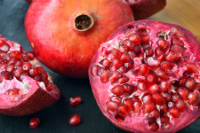Food for Thought. . .
"The best and most beautiful things in the world cannot be seen or even touched - they must be felt with the heart." - Helen Keller
Mighty Pomegranate (Punica granatum)

Inside a lumpy, thick-skinned pomegranate you'll find a treasure of jewel-like arils-ruby seeds surrounded by sacs of flavorful juice. Pomegranate is both richly sweet and tart and exceptionally refreshing. Savor the flavor by eating the arils by the spoonful, adding them to salads or to a bowl of Greek yogurt. Any way you choose, you’ll reap the health benefits of this exotic fruit.
Pomegranate is native to the mountainous regions along the Caspian Sea, near northern Iraq and northwest Iran. For centuries, cultures around the world have used all parts of the tree-roots, bark, flowers, peel, seed and seed oil-medicinally to treat a range of health concerns, from digestive disorders and dysentery, to fever and heart ailments. In the West, the fruit and seed are typically used in medicinal preparations. Modern research indicates that pomegranate may be beneficial for reducing risk and supporting treatment for arthritis, certain types of cancers, erectile dysfunction, and heart disease.
A compound found only in pomegranates called punicalagin is beneficial to the heart and blood vessels. Punicalagin is responsible for pomegranate's antioxidant effects. In fact, pomegranate has more antioxidant power than red wine and green tea! Preliminary research shows that drinking unsweetened pomegranate juice helps lower cholesterol, lower blood pressure, improve blood flow to the heart, and may help protect against the formation of blockages in the arteries. Further research is needed to determine how much pomegranate juice (or as a nutritional supplement) is beneficial for different people and for different health concerns.
When buying pomegranate, don't shy away from a fruit that isn't perfectly round or feels heavy. Unusual shape, and weight indicate a fruit that is plump with arils and juice. Pomegranates do not sweeten once picked, so you'll want to avoid fruits that look dried out.
Image: Geo-grafika/bigstockphoto.com


